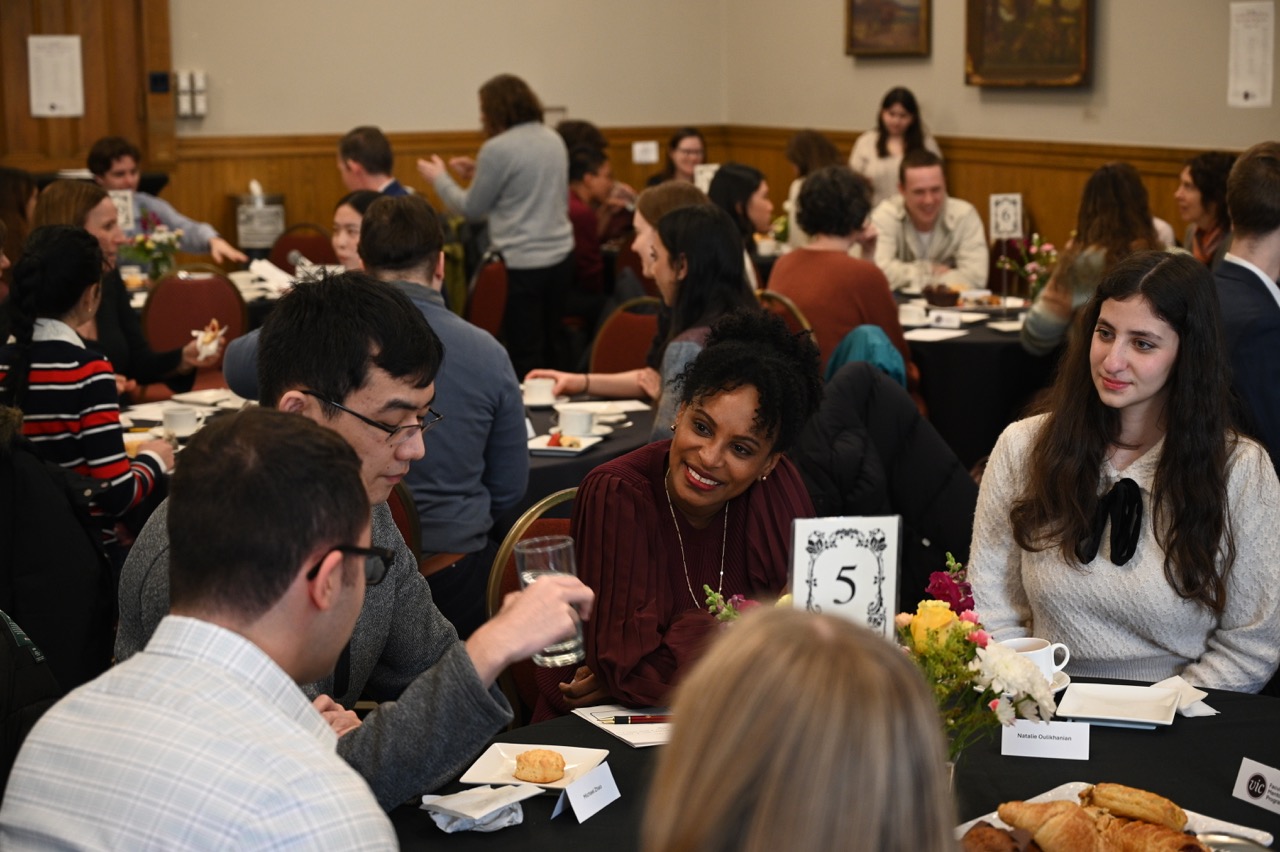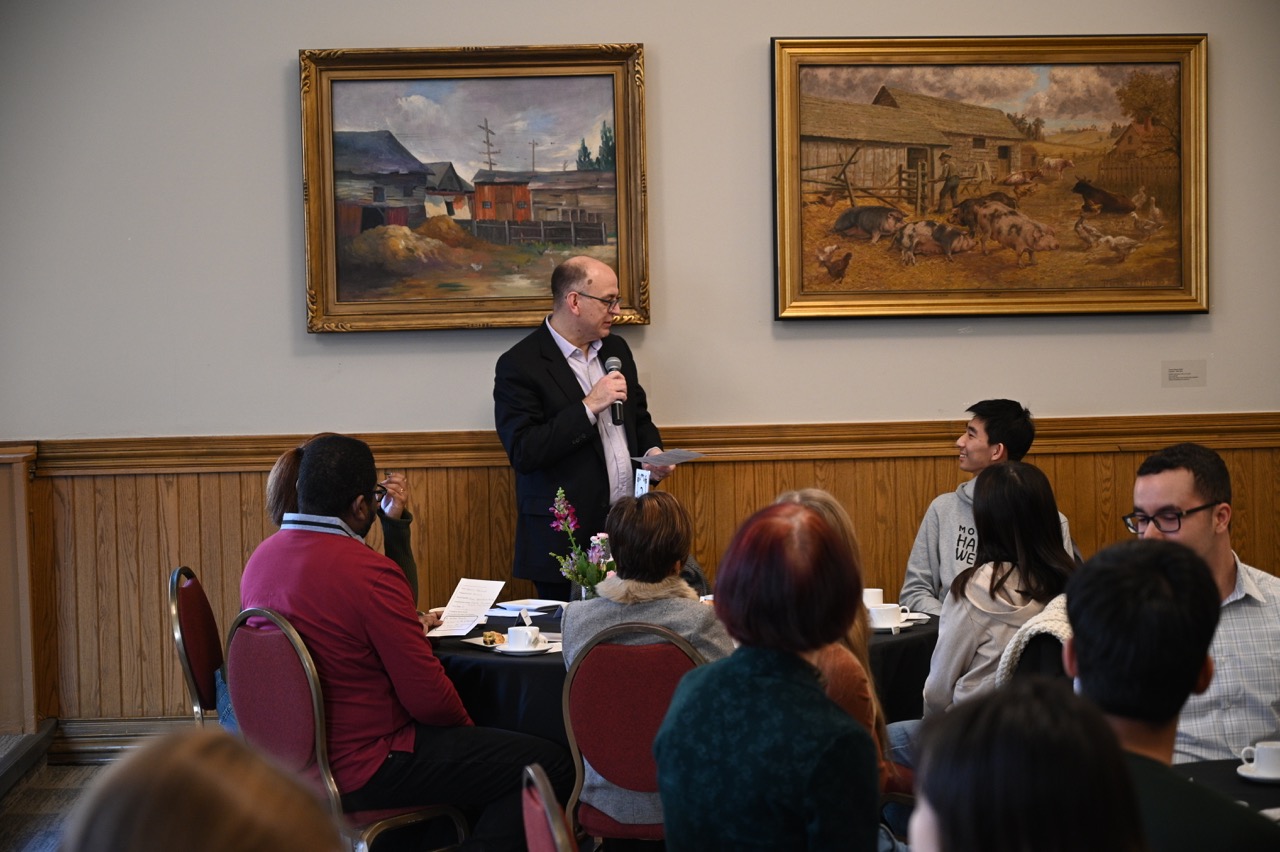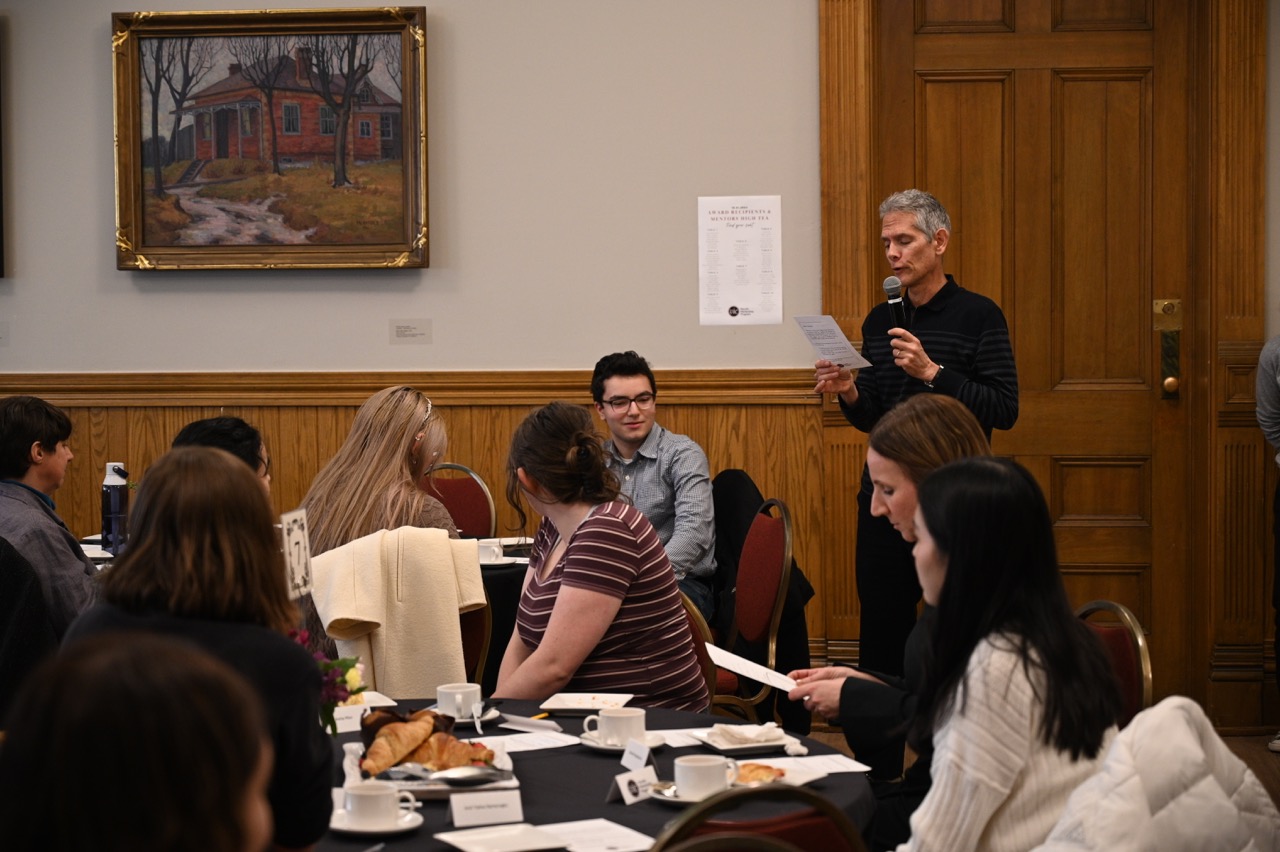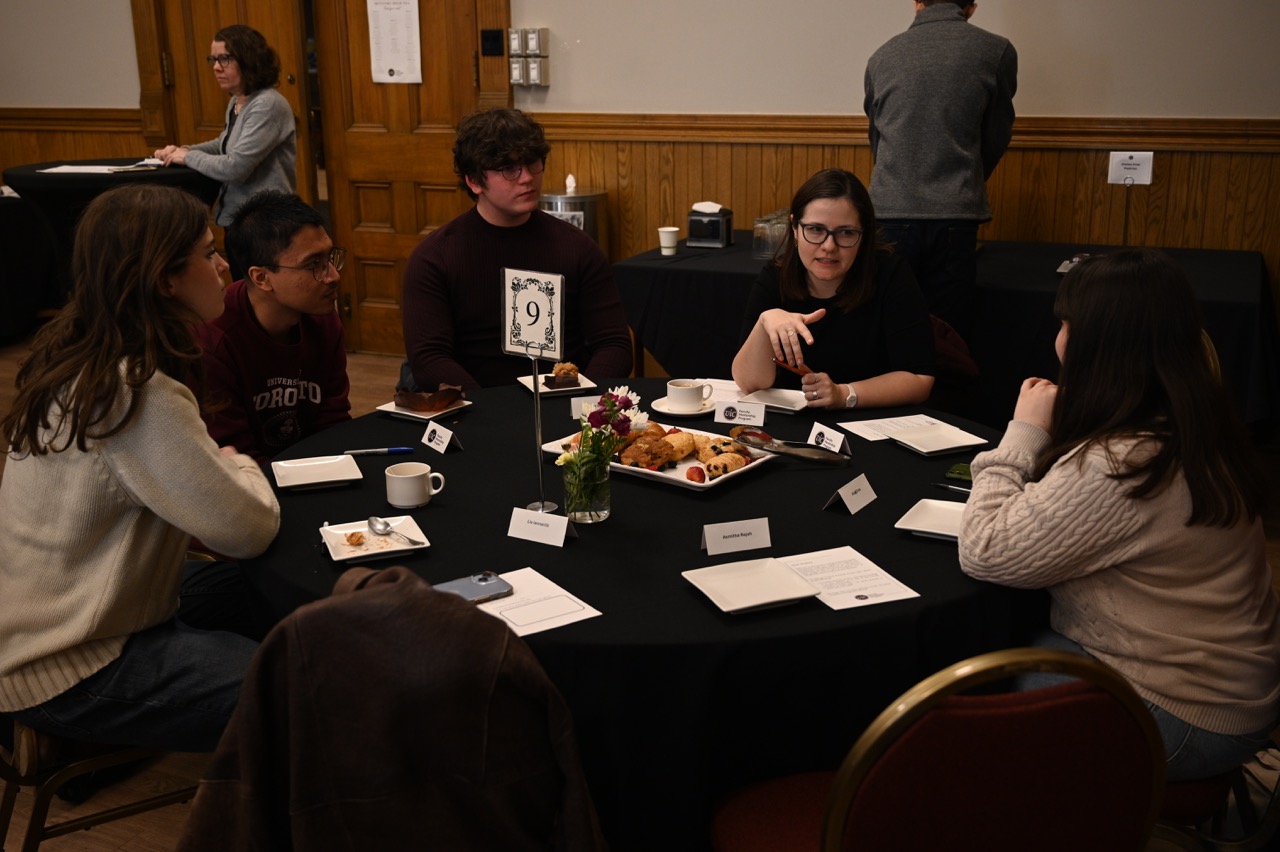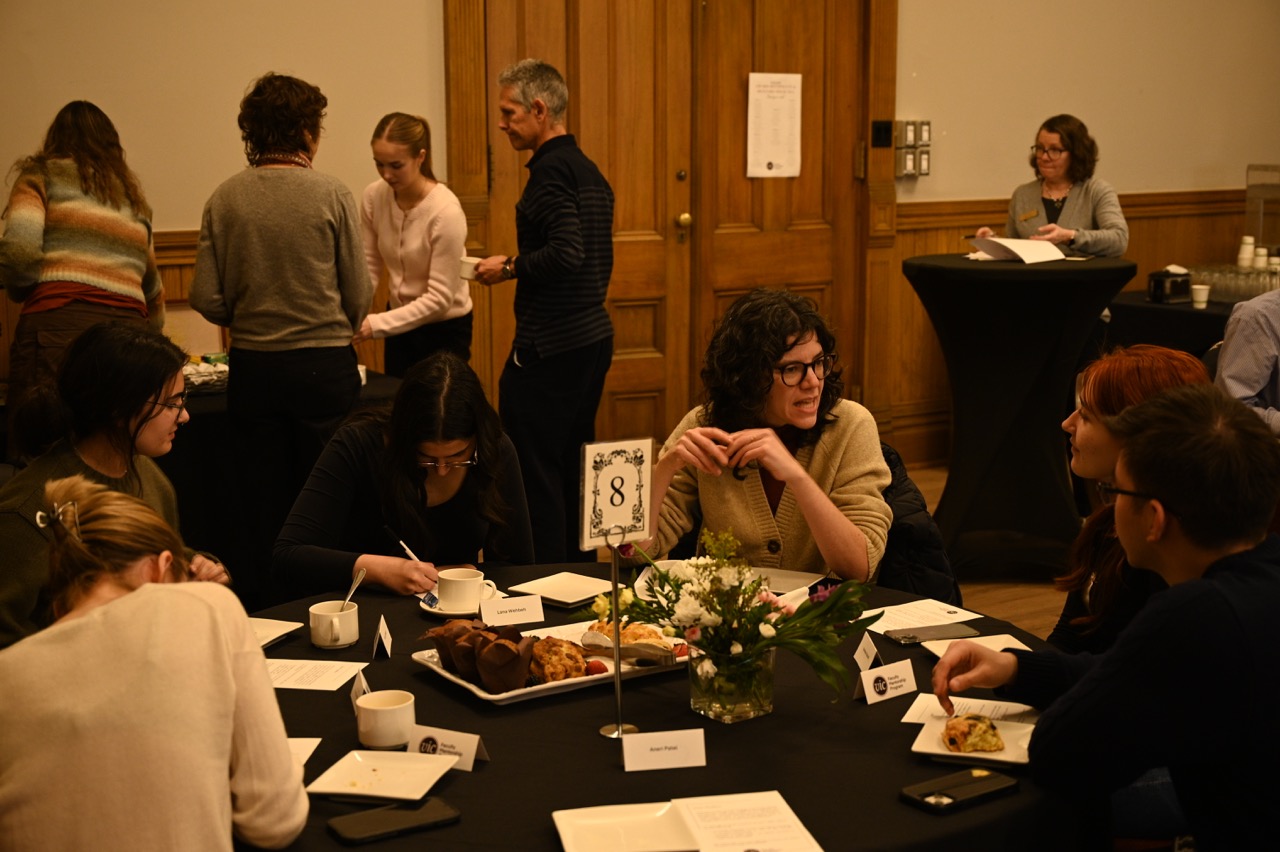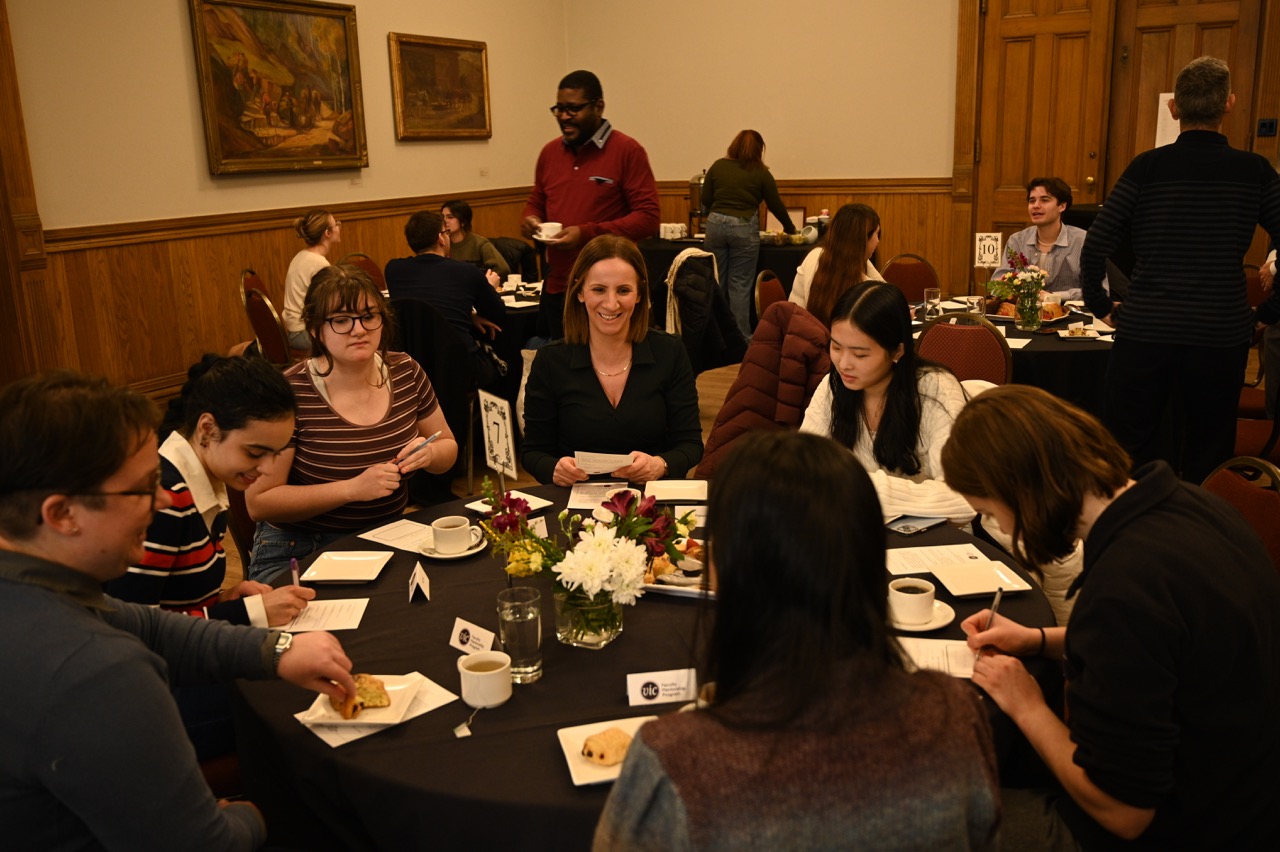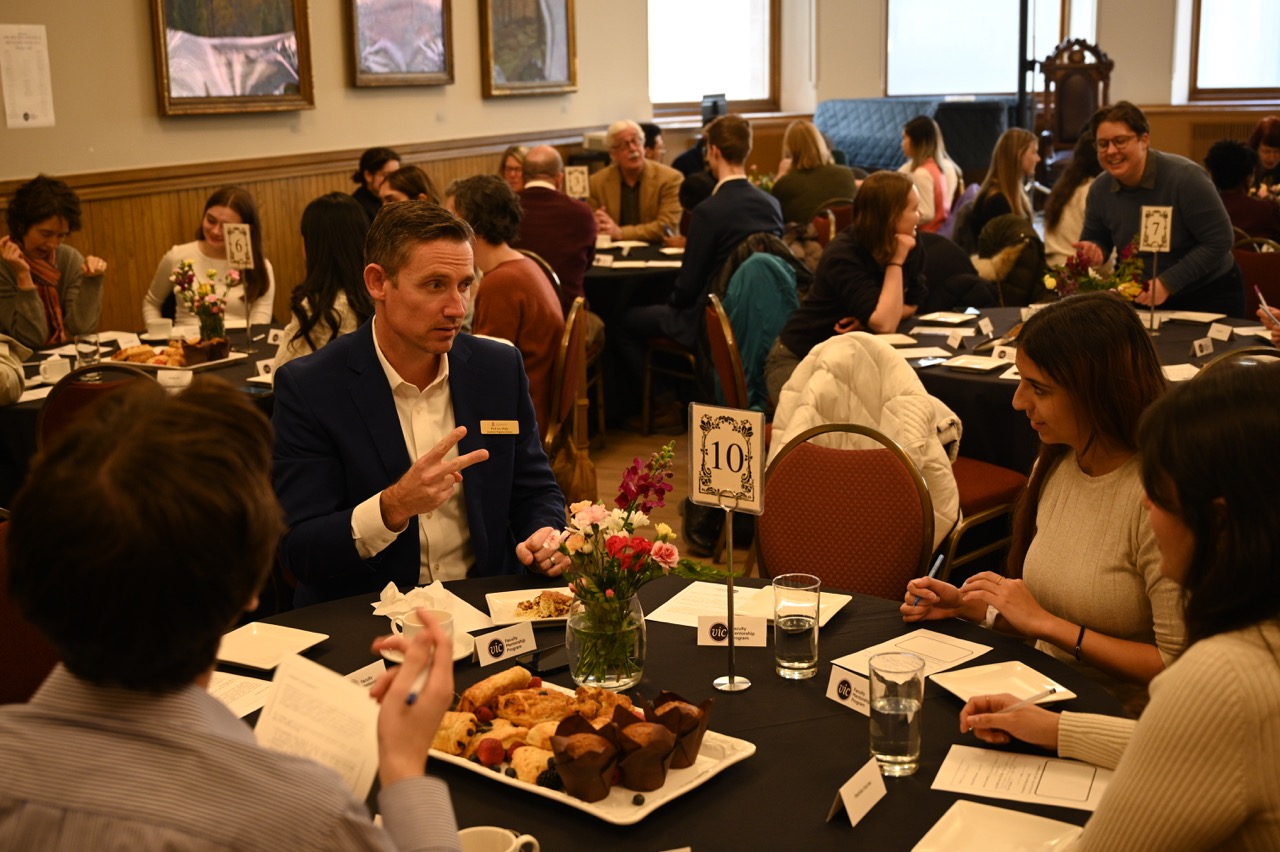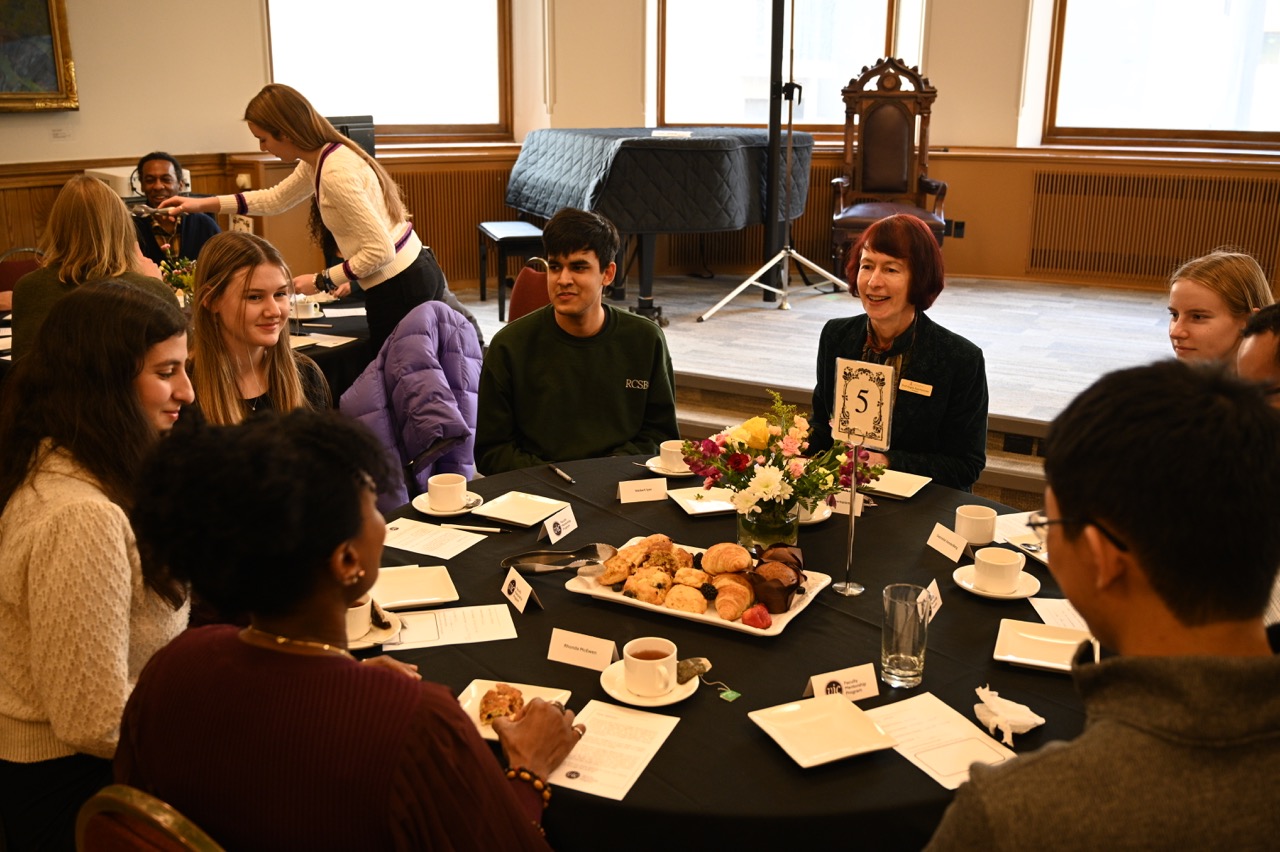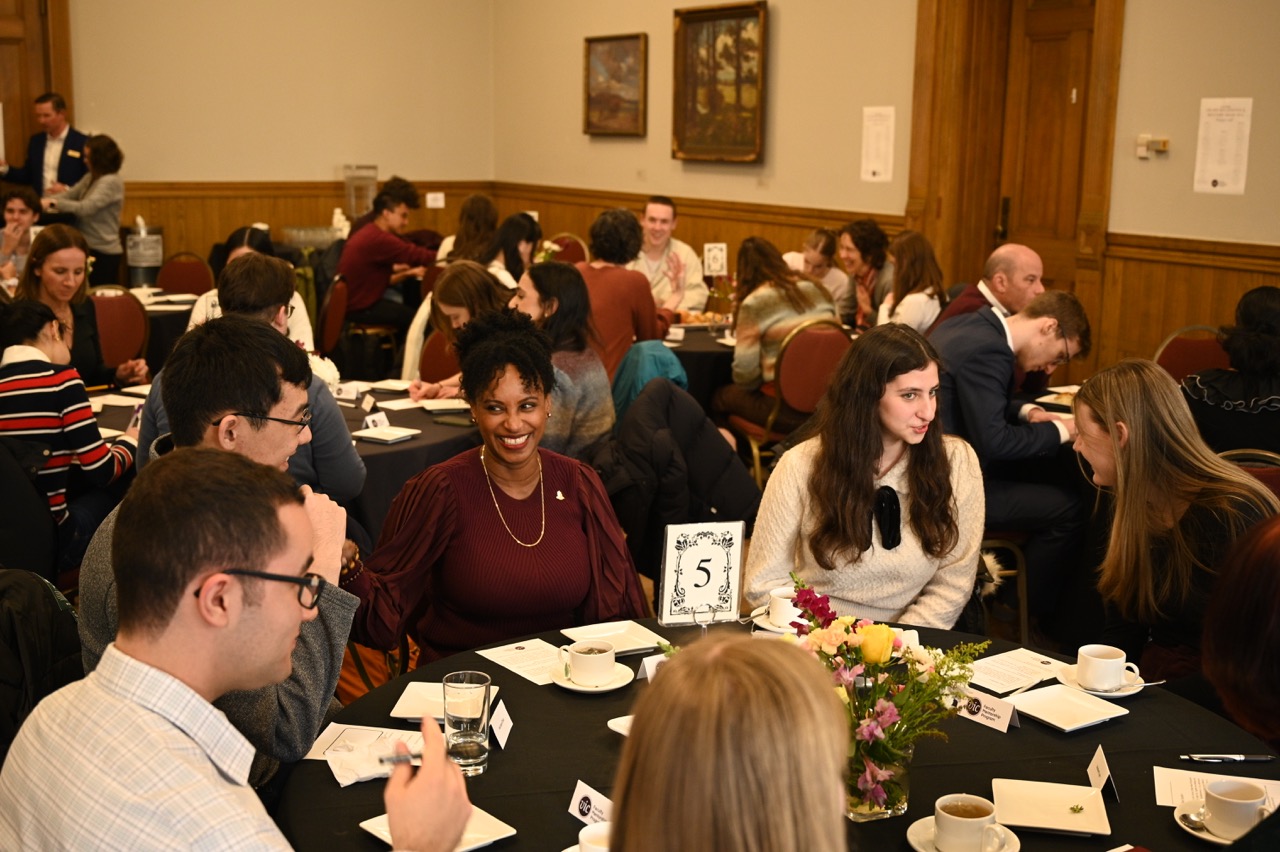Victoria College, in partnership with the Principal's Office and the Office of the Registrar & Academic Advising, is offering faculty mentorships for second-year Vic students! Established in 2015, this program connects students with dedicated Vic faculty to foster community-building. The program's success has led to many of these relationships continuing throughout the students' undergraduate years.
Vic students apply at the end of their first year of studies once they've selected their programs (specialists/majors/minors).
They will then be paired with a Victoria College Fellow or Associate, giving them access to resources, academic and research opportunities, and personalized advice in a supportive and informal setting.
There are limited spaces available so apply early!
Key Benefits of a Faculty Mentorship:
- Engage in the thoughtful exchange of ideas
- Develop a supportive network to access resources
- Receive advice about academic, research, and career goals
- Learn about opportunities related to specific disciplines
- Enhance the student experience
- Experience a sense of community at Vic

"Throughout the academic year, my mentor [Prof. Lima] shared incredibly valuable advice that was broadly applicable: from PhD life and networking to interview prep and beyond. She also kindly agreed to serve as one of my academic referees when I was applying for the Scholars in Residence program. We even went out for lunch once, and she insisted on covering it, saying, “Of course, I’m your mentor!.”
Jiayi (Skyler) Du, Victoria College Class of 2027
Applications are now closed for 2025-2026.
Inquiries: vic.principal@utoronto.ca
FAQ, Timeline and Guidelines
FAQ
What is the Victoria College Faculty Mentorship Program?
- The Victoria College Faculty Mentorship Program gives Victoria College second-year students the opportunity to be paired with a Victoria College Fellow or Associate. This unique program is administered by the Office of the Principal in collaboration with the Office of the Registrar and Academic Advising.
Who can apply?
- All Victoria College students entering their second year of study are eligible to apply. Applications for 2025-2026 are now closed. Please check back in July for further information.
Who are the mentors?
- Faculty Mentors are selected from the Victoria College Fellows and Associates and paired based on interest and expertise. You can find a full Fellows and Associates list here. While we endeavour to provide program-specific mentors as often as possible, we believe the benefits (networking, faculty support, research guidance, community building, etc.) still offer students meaningful support and community opportunities.
Can I choose my own mentor?
- The Victoria College Principal oversees the pairing of mentor and mentee.
How are participants chosen?
- Program participants complete an application process and are selected based on several factors, including a demonstrated need for mentorship support, early achievement in their academic course of study, and the ability to articulate how mentorship will aid them in achieving their goals. Completed applications include biographical information, a statement of academic achievement and short answer questions about personal and professional goals. Candidates who are members of Indigenous, Black, racialized and 2SLGBTQ+ communities, persons with disabilities, and other equity-deserving groups are especially encouraged to apply.
How many participants will be accepted into the program?
- We hope to match 40 mentor/mentee pairs for 2025-2026.
When will you let me know if my application to the program has been accepted?
- We notify students accepted into the program within a week of the application deadline. Students will be notified via email. We encourage early applications so that the matching process can start right away.
How long can I stay in the program if I am accepted?
- The Faculty Mentorship Program is intended as a support for second-year students. However, it is not uncommon for mentors and mentees to continue to meet occasionally throughout a mentee’s undergraduate degree.
What if I am not happy with my mentor?
- We strive to make each mentor/mentee pairing a success. However, if you find that your mentor/mentee pairing is not working, please contact our faculty mentorship coordinator, Karen Wong, at vic.principal@utoronto.ca.
How many times do I meet with my mentor?
- Meeting frequency and levels of involvement vary based on several factors. The Faculty Mentorship Program recommends that each mentor/mentee pairing find a meeting schedule that works best for them. Please refer to the mentorship guidelines posted below.
Timeline
July — Invitations with a link to the application form are sent out to Vic students who are entering their second year.
September — Collected student information is used by the Vic Principal's Office to match up students with Victoria College Fellows and Associates.
Mid-Late September (upon confirmation of registration for the academic year) — Confirmation notices are sent out to each matched pair notifying the students who their mentors are with links to the mentorship guidelines (see below).
Early/Mid-October — Introductory social event for newly-matched mentors and mentees.
March — Annual Reception to celebrate all current and past faculty mentors and their mentees.
Mentorship Guidelines for Students
A faculty mentor is someone who can be a role model and advisor for you as you explore your academic and career goals.
The mentoring relationship does not necessarily require a large investment of time. Most students will meet with their mentors two to three times per semester. These meetings could be in the professor’s office, over coffee or lunch in a cafeteria, or even accompanying your mentor to a departmental lecture. The nature and frequency of the meetings will be mutually discussed and determined.
We hope that this is will be an enjoyable, beneficial and productive relationship for you. However, to make the most of the arrangement there are a few things we encourage you to keep in mind:
Expectations of the student:
- Respond to the initial contact email from your assigned mentor in a timely fashion
- Keep appointments with your mentor, and be punctual
- Respect your mentor’s time – faculty members have many demands on them that fluctuate depending on the time of year.
- Have reasonable expectations for what your mentoring relationship will be. Your mentor will not be your tutor, editor or personal counselor. If you need assistance in other areas you should contact the Registrar’s Office (call: 416-585-4508, ext.0).
- Be honest, open and ask questions
- Schedule mutually agreeable times and modes of communication (e.g. phone, email, in-person meetings, text messages – whichever is best)
Tips for ensuring a healthy dialogue:
- Discuss academic and career goals.
- Let your mentor know what you enjoy, what your strengths are, and what you are curious about.
- Develop key questions for each meeting to ensure focus
- Approach discussions with an open mind
- Respect confidences
- Accept constructive feedback gracefully – your mentor’s feedback is meant to be helpful as you work towards your academic and career goals.
- Don’t be afraid to ask questions – your mentor will be very open to sharing knowledge, wisdom, career challenges and successes, as well as technical expertise.
- Don’t hesitate to share an assignment that you are proud of, or discuss one that has proved challenging.
- Show interest in your mentor’s research and/or undergraduate courses
Some questions to ask:
- What academic adjustments should I be making to ensure my second year of university is successful?
- What undergraduate research opportunities are there in this field?
- What are some of the unique, co-curricular opportunities available to undergraduate students in this field?
- What kinds of courses should I consider taking in future to meet my goals?
- What kinds of co-curricular activities would you suggest I seek out to help me meet my goals?
Mentorship Guidelines for Mentors
Thank you for contributing your time and effort to mentor exceptional second-year students. We recognize that mentoring undergraduate students may be new territory for you, and may be very different from mentoring graduate students. Generally, mentors in this program offer advice and support on academic questions, research, and career development.
Mentors are primarily advisors and role models. Your academic and career experience puts you in a position to share knowledge, and in particular to provide information about opportunities related to your discipline.
Effective mentoring is characterized by mutual respect, trust, understanding and empathy. Good mentors can share life experiences and wisdom, career successes and challenges and technical expertise. They are good listeners, good observers and good problem-solvers.
As you have likely already observed in your role as a faculty member, different students will require different amounts and kinds of attention, advice, information and encouragement. Some students will feel comfortable approaching their mentors; others will be shy, intimidated or reluctant to seek help. A good mentor is approachable and available.
Often students will not know what questions to ask, what information they need or what their options are. A good mentor can lessen such confusion by getting to know students, listening to their questions or comments and being familiar with the kinds of suggestions and information that can be useful.
Effective mentoring need not require large amounts of time. An experienced, perceptive mentor can provide great help in a short period by making the right suggestion or asking the right question.
Below are a few tips and guidelines on how to negotiate the mentoring relationship with an undergraduate student to increase the chances that the relationship will be mutually enjoyable, beneficial, and productive.
Tips for Effective Mentoring
- Ask your student about his or her academic and career goals. Find out what they enjoy, are curious about, and what they are good at. Suggest early exposure to a range of courses, summer jobs or internships.
- Be frank and direct. Let students know what you can (and can’t) offer and have an early discussion of the scope of the mentoring relationship.
- Take your student seriously—a question or problem that seems trivial or irrelevant to you might not be, or it might mask a more serious issue.
- Don’t always meet in your office—a student might be more comfortable in a lab, local cafeteria, or even just walking across campus.
Suggested Mentoring Activities:
- Meet for an informal breakfast or lunch to learn about each other’s backgrounds and interests
- Review academic and career plans, selection of classes and electives
- Invite your student to one of your classes
- Invite your student to see your research/lab, etc.
- Attend a departmental lecture or special event together
- Ask your student about his/her course work, perhaps encouraging the sharing of an assignment they are proud of or one found to be challenging
- Identify and explore possible University resources and supports for the student. If you have any concerns, do not hesitate to refer students to the Registrar's Office for academic advising or learning strategist support (email: vic.registrar@utoronto.ca or phone: 416-585-4508, ext.0).
Mentoring Best Practices:
- Develop and adhere to a schedule of regular meetings—suggested minimum of two meetings per semester
- Make every effort to keep your appointments with your student
- Create an atmosphere that makes a student feel empowered to ask questions and engage in a thoughtful exchange of ideas
- Share stories of past academic and career experiences, successes and challenges
- Maintain regular contact, including email, offering support and advice
- Be clear about your expectations and your boundaries
- Be a sounding board by actively listening to questions and concerns
- Respect confidentiality
- Help your student access resources and expand networks on campus
- Contact your student if you have not heard from him/her in a while
- Provide your student with constructive feedback about areas for personal and academic development
- And remember not to be overly critical – temper constructive criticism with positive encouragement and support
- Enjoy the opportunity to develop this important relationship as a mentor and let the student know you value the time with them! Mentoring relationships can make a significant difference in the student’s overall university experience, personal development and career paths. As well, you may find the mentoring experience highly rewarding, knowing you are making a difference in a student’s life.
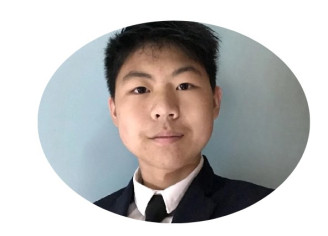
"My 1-1 meetings with my mentor [Prof. Istrate], gave me valuable insight into the various physics programs that U of T offers. His advice also helped me improve my applications to several summer programs."
William Zheng, Victoria College Class of 2027
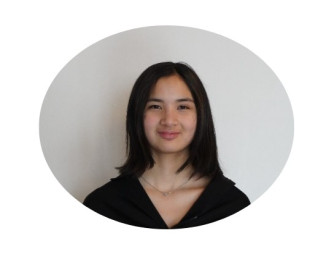 “I was able to build a connection with [Prof. Kijima] and learn more about the opportunities available to me in this program. I also learned about some summer opportunities for research.”
“I was able to build a connection with [Prof. Kijima] and learn more about the opportunities available to me in this program. I also learned about some summer opportunities for research.”
Sarah Padwal, Victoria College Class of 2027
Enjoy These Photos of Our Mentors and Mentees from the 2024 High Tea Reception!
